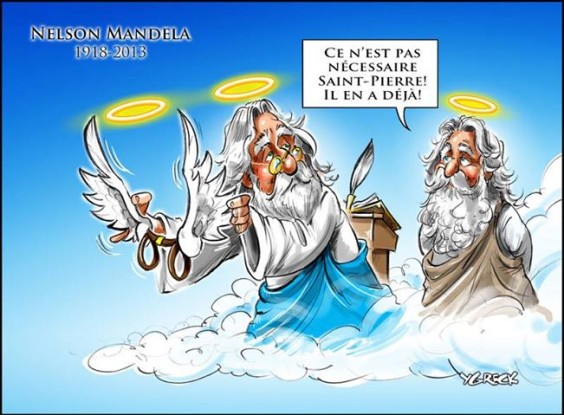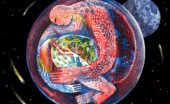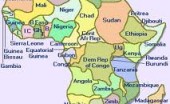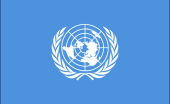Re The UN General Assembly Speaker Schedule is Here! I note that whoever will be speaking for Canada this year…
Nelson Mandela R.I.P.
Written by Diana Thebaud Nicholson // December 15, 2013 // Africa // 3 Comments
The struggles that follow the victory of formal equality and universal franchise may not be as filled with drama and moral clarity as those that came before, but they are no less important. For around the world today, we still see children suffering from hunger, and disease; run-down schools, and few prospects for the future. Around the world today, men and women are still imprisoned for their political beliefs; and are still persecuted for what they look like, or how they worship, or who they love.
— Nelson Mandela memorial: Obama hails ‘giant of history’
Miriam Makeba, Ladysmith Black Mambazo and Paul Simon perform N’Kosi Sikeleli
Remembering Days of Miracle and Wonder — Paul Simon on Mandela’s Role in ‘Graceland’ – a must read for all fans of Graceland
The funeral organization apparently was not without some ‘issues’.
Nelson Mandela funeral: no Bill Clinton, empty seats and Prince of Wales snubbed?
Bill Clinton was a high profile no-show at Nelson Mandela’s funeral, while empty seats and the Prince of Wales relegated to a number of rows back
Nelson Mandela buried at Qunu ancestral home
Nelson Mandela’s body has been laid to rest in a family plot, after political and religious leaders paid tribute to South Africa’s first black president at a state funeral service.
His widow, Graca Machel, and President Jacob Zuma were present for the private, traditional Xhosa burial at Mr Mandela’s ancestral home in Qunu. (See BBC pictures)
Seems things changed, we doubt it was Bishop Tutu’s mind – there must be a back story here.
Desmond Tutu changes mind, going to Mandela funeral
Government has always maintained retired archbishop is on guest list
Two jarring notes – the seemingly deliberate exclusion of the second most iconic South African from Nelson Mandela’s funeral (hardly a private ‘family affair’ with some 5,000 guests); and the second, a sad reflection on the ability of some individuals to insert themselves into public events, with potentially disastrous consequences.
Desmond Tutu: I will not attend Nelson Mandela’s funeral
Longtime friend cancels flights after receiving no indication of being on guest list, as president’s office says he is invited.
ANC accused of pettiness for excluding Desmond Tutu from Mandela funeral
South Africa’s ruling party lambasted for not inviting retired archbishop and old Mandela ally turned fierce government critic
Desmond Tutu says he will skip Nelson Mandela funeral over perceived snub by South African government
(Canadian Press via National Post) It was the latest problem to hit the 10-day mourning period for Mandela, the former president who died on Dec. 5 at age 95. The public memorial ceremony for Mandela on Tuesday at a Soweto stadium started late, had problems with loudspeakers and featured a signing interpreter for the deaf who made incomprehensible gestures, is a self-described schizophrenic and reportedly once faced charges of murder and other serious crimes.
[Mac Maharaj, a spokesman for South African president Jacob Zuma] said he did not know whether Tutu had been invited to eulogize Mandela. Tutu has preached at the funerals of most major anti-apartheid figures, including Steve Biko, Chris Hani, Walter Sisulu and others.
“It’s a bit hard to figure out what’s going on,” said Adam Habib, vice chancellor of Johannesburg’s University of the Witwatersrand. “My gut feeling is it’s probably an administrative bungle more than an intentional snub. But it doesn’t seem he was the first person on their mind when they were making choices about who speaks. And he has been quite critical of Zuma’s propensity for corruption.”
The Sign Language Interpreter At Mandela’s Memorial Was ‘A Complete Fraud’ Making Nonsense Gestures Update from Slate: Yep, the Story of the Bogus Mandela Signer Just Got Even Crazier
Obama and Castro shake hands, Zuma humiliated at Mandela memorial
(BBC): Nelson Mandela 1918-2013 Features and Analysis
(National Post): Nelson Mandela
(Globe & Mail) Nelson Mandela 1918-2013
The Metropolitain publishes three eloquent tributes
MANDELA: The captain of his soul. A man for our seasons. By Beryl Wajsman
Remembering Mandela By l’Hon. Irwin Cotler
How Mandela Made a Difference By John Parisella
Tony Karon: Three Myths about Mandela Worth Busting
I sometimes feel Nelson Mandela is in need of rescuing, trapped in some pretty bizarre narratives that have nothing to do with his own story or politics. Full disclosure: I freely admit that Nelson Mandela is the only politician for whom I’ve ever voted; that I celebrate him as a moral giant of our age, and that I proclaimed him my leader (usually at the top of my tuneless voice, in badly sung Xhosa songs) during my decade in the liberation movement in South Africa. That’s maybe why the “Mandela” I’ve encountered in so much American mythology is so unrecognizable. Herewith, the three most egregious versions:
World pays homage to Mandela in mass memorial service
(Reuters) – World leaders, from U.S. President Barack Obama to Cuba’s Raul Castro, will pay homage to Nelson Mandela at a mass memorial in South Africa on Tuesday that will recall his gift for bringing enemies together across political and racial divides.
Obama and Castro, whose countries maintain an ideological enmity lasting more than 50 years, are among the designated orators at a Johannesburg football stadium where 23 years earlier Mandela – freshly freed from apartheid jail – was hailed by cheering supporters as the hope for a new South Africa.
Coinciding with U.N.-designated Human Rights Day, the memorial service for Mandela in the 95,000-seat football City stadium is the centrepiece of a week of mourning for the globally-admired statesman, who died on Thursday aged 95
Adam Daifallah: Canada’s stance against apartheid helped bring freedom to South Africa
Early in its first term, the Mulroney government adopted a series of sanctions against South Africa. This new, activist approach was in stark contrast to Canada’s approach during the Trudeau era, when the government failed to seriously take on the odious South African policy.
While the apartheid regime is viewed today as one of the most loathsome of the 20th century, in the 1980s world leaders were divided on how to deal with the issue. Mr. Mulroney’s principled stand came at a significant personal cost, even threatening to derail two of his major policy objectives: free trade and the acid rain treaty.
Ever the realist, the Cold War implications of apartheid weighed heavily on Mr. Mulroney’s mind. But he strongly believed that the Thatcher/Reagan position of being reluctantly prepared to accept the apartheid regime as an acceptable, however unappetizing, pawn in the struggle against the greater evil of the Soviet Union, was morally wrong and doomed to fail. He knew that without forceful action to end apartheid, the world risked a bloodbath with potentially horrific consequences for the African continent and beyond.
Nelson Mandela tributes to be attended by Harper, former PMs, former GG
Jean Chretien, Kim Campbell, Brian Mulroney and Michaëlle Jean will join Harper in South Africa
Former prime minister Paul Martin was invited to join the Canadian delegation, but has a large public meeting with the Inuit scheduled in Labrador on Monday.
Bob Rae: Mandela taught us courage, love and compassion
(Globe & Mail) He was, of course, a giant of our time. He was also a a wonderfully engaging man, warm, completely unpretentious, with a great sense of humour and deep sense of humanity. He taught us all important lessons about courage, love, and compassion. He emerged from his ordeal in prison with no bitterness. Most politicians become vindictive after a few minutes in opposition. He deserves the thanks of the world for what he did and stood for.

Soweto Gospel Choir – N’Kosi Sikeleli
(PBS Frontline) The long walk of Nelson Mandela – an intimate portrait of one of the 20th century’s greatest leaders
Mandela’s Unfinished Business
The Incomplete Legacy of South Africa’s Founding Father
(Foreign Affairs) Nelson Mandela lived one of the great lives of the twentieth century. He was a political prisoner who became a free man, a freedom fighter who achieved reconciliation, and a president who fought for equality and development. “Mandela showed us that one man’s courage can move the world,” U.S. President Barack Obama said on his recent trip to South Africa. For many, Mandela’s life is an enduring reminder that hope and activism can change history for the better.
Yet South Africa is hardly an unqualified success story. The unemployment rate hovers just under 30 percent, and nearly a quarter of South Africans live at or near the poverty line. A United Nations report recently revealed that 1.4 million South African children live in homes that rely on dirty streams for drinking water, 1.5 million do not have access to flushing toilets, and 1.7 million live in shacks with neither washing nor cooking facilities. Almost six million South Africans have HIV/AIDS, and the country’s young population is growing rapidly: nearly 40 percent of the population was born after Mandela’s release from prison in 1990.
Outside observers often try to separate Mandela’s past from South Africa’s present. If things have fallen apart, the argument goes, it is only because Mandela’s political party, the African National Congress (ANC), failed to follow him to the promised land. Even in his mid-nineties, Mandela was aloof yet omnipresent: a constant reminder of the nobility of South Africa’s anti-apartheid past and a yardstick that implicitly measured the shortcomings of today’s ANC leaders.
Would another Nelson Mandela cure South Africa of its ills? This question is at the heart of the debate about Mandela’s legacy and South Africa’s future. But it is the wrong question. Although Mandela’s story has had many chroniclers, his grand strategy — specifically, his role in the international fight to define what South Africa was and what it might become — has been curiously underappreciated. It raises a fundamental and more important question: What is South Africa? It is impossible to understand South Africa today without appreciating the effects of Mandela’s complex answer.
South Africa, world mourn ‘giant for justice’ Mandela
(Reuters) – South African anti-apartheid hero Nelson Mandela died peacefully at home at the age of 95 on Thursday after months fighting a lung infection, plunging his nation and the world into mourning for a man revered as a moral giant.
The former president and Nobel Peace Prize laureate had been frail and ailing for nearly a year with a recurring lung illness that dated back to the 27 years he spent in apartheid jails, including the notorious Robben Island penal colony.
But while his passing had been long expected, President Jacob Zuma’s announcement of the death late on Thursday shook South Africa. The streets of the capital Pretoria and of Johannesburg were hushed, and in bars and nightclubs, music was turned off as people gathered to quietly talk about the news.
Mandela lauded for his work for peace, development and fighting HIV/AIDS
United Nations Secretary-General Ban Ki-moon praised Nelson Mandela, who died Thursday, for showing “what is possible for our world and within each one of us — if we believe, dream and work together.” Mandela’s legacy includes ending apartheid in South Africa, promoting development and fighting HIV/AIDS. LinkedIn (12/6), The Guardian (London) (12/5), Devex.com (free registration) (12/6), The Guardian (London) (12/5)
South Africa’s Nelson Mandela dies in Johannesburg
South Africa’s first black president and anti-apartheid icon Nelson Mandela has died at the age of 95.
(BBC) Mr Mandela led South Africa’s transition from white-minority rule in the 1990s, after 27 years in prison for his political activities.
Announcing the news on South African national TV, President Jacob Zuma said Mr Mandela was at peace.
“Our nation has lost its greatest son,” Mr Zuma said.
“Although we knew that this day would come, nothing can diminish our sense of a profound and enduring loss.” Reaction to Nelson Mandela’s death
 Nelson Mandela dead at 95
Nelson Mandela dead at 95
Nobel laureate and human rights campaigner spent 27 years in prison
(CBC) Nelson Mandela, the anti-apartheid icon who became the first president of a democratic South Africa, passed away Thursday at his home in Johannesburg after a prolonged lung infection. He was 95.
Mandela was a prominent international figure for more than half a century, first as a leading human rights campaigner in South Africa and then as the world’s best-known political prisoner.
Following his release, he again became the leader of the anti-apartheid struggle, and in 1994 became the first president of a democratic South Africa.
On July 18, 2009, the first Mandela Day declared by the United Nations, UN Secretary General Ban Ki-moon spoke about how “Nelson Mandela has made a lasting imprint on our lives.”
Mandela: the first 25 years
Born the son of a tribal chief on July 18, 1918, in the village of Mvezo in Transkei in the Eastern Cape province, he was given the name Rolihlaha Mandela. Rolihlaha roughly translates from Xhosa as “troublemaker.” For the white South African government, he would soon live up to his name ….
Nelson Mandela dead at 95: World mourns South Africa’s ‘greatest son’
(National Post) JOHANNESBURG, South Africa — Nelson Mandela, who became one of the world’s most beloved statesmen and a colossus of the 20th century when he emerged from 27 years in prison to negotiate an end to white minority rule in South Africa, has died. He was 95.
South African President Jacob Zuma made the announcement at a news conference late Thursday, saying “we’ve lost our greatest son.”
His death closed the final chapter in South Africa’s struggle to cast off apartheid, leaving the world with indelible memories of a man of astonishing grace and good humour. Rock concerts celebrated his birthday. Hollywood stars glorified him on screen. And his regal bearing, greying hair and raspy voice made him instantly recognizable across the globe.
World leaders expressed their deep remorse after the death of Mandela.
The Nelson Mandela I knew: Stephen Lewis
Former UN envoy Stephen Lewis recalls the enduring affection that Nelson Mandela had for Canada – a touching intimate portrait of the relationship between Mandela and his wife Graça Machel.
Nelson Mandela: A Canadian diplomat remembers his time with the South African leader
Months spent working with Nelson Mandela were life altering, says Gary Bedell. They were heady times as the weight of history pervaded every moment.
(Toronto Star) As the Canadian government Challenger jet descended toward Ottawa in June 1990, Nelson Mandela meticulously brushed his greying hair to prepare for the arrival. He left a handful of the tightly curled strands on the arm of his seat.
When we left the plane, I was tempted to grab them as a souvenir, but I was too embarrassed. I have regretted it many times since. Still, I had no idea then that Mandela would provide me with far more lasting memories of our time together.
I was a senior officer in the protocol office of the External Affairs department, charged with the delicate task of organizing a visit that was adequate to Mandela’s hero status but wouldn’t offend the South African government, which considered him nothing more than a private citizen since his release from prison a few months before.
Don’t Sanitize Nelson Mandela: He’s Honored Now, But Was Hated Then
If we turn the late South African leader into a nonthreatening moral icon, we’ll forget a key lesson from his life: America isn’t always a force for freedom.
Now that he’s dead, and can cause no more trouble, Nelson Mandela is being mourned across the ideological spectrum as a saint. But not long ago, in Washington’s highest circles, he was considered an enemy of the United States. Unless we remember why, we won’t truly honor his legacy.
In the 1980s, Ronald Reagan placed Mandela’s African National Congress on America’s official list of “terrorist” groups. In 1985, then-Congressman Dick Cheney voted against a resolution urging that he be released from jail. In 2004, after Mandela criticized the Iraq War, an article in National Review said his “vicious anti-Americanism and support for Saddam Hussein should come as no surprise, given his longstanding dedication to communism and praise for terrorists.” As late as 2008, the ANC remained on America’s terrorism watch list, thus requiring the 89-year-old Mandela to receive a special waiver from the secretary of State to visit the U.S.
From their perspective, Mandela’s critics were right to distrust him. They called him a “terrorist” because he had waged armed resistance to apartheid. They called him a “communist” because the Soviet Union was the ANC’s chief external benefactor and the South African Communist Party was among its closest domestic allies. More fundamentally, what Mandela’s American detractors understood is that he considered himself an opponent, not an ally, of American power. And that’s exactly what Mandela’s American admirers must remember now.
David Lizoain (via Liam McHugh-Russell) What the Economist said about Nelson Mandela
Right or left, Nelson Mandela is probably the most respected man in the world. But this consensus was not always shared.
At the prompting of my brother, I thought it would be interesting to see what the Economist had to say about Mandela in the context of the years prior to his release and presidency. A similar exercise for Salvador Allende proved illuminating.
The general line the Economist took with respect to apartheid was less terrible than I expected, even in light of a fixation on communism right up until the fall of the Berlin Wall. Who stands out for having been in the wrong in a big way is Margaret Thatcher and her British Conservative party.




3 Comments on "Nelson Mandela R.I.P."
David Kilgour
My thought on the passing of Nelson Mandela:
Nelson Mandela was probably the greatest leader Africa, North America or any continent produced during the later 20th century. On every level, including the vitally important one of democratic inclusion of fellow citizens, he appears to have had no equal. The world will miss his inspiration terribly.
Peter Schiefke
I greatly admire the South African belief that people do not die, they “transition”. So let us all join those coming together on the streets of Johannesburg in the celebration of not only a great man’s life, but also his transition.
There is no doubt Nelson Mandela deserves much of the adulation heaped upon him in death; for he displayed a capacity far greater than many of even of the best of Christians for forgiving his enemies & set an example for politicians everywhere in making the common good his No. 1 priority. But he was not a great administrator &, at the best, a moderately effective President. Moreover, as so often the case with great leaders, he failed in preparing for his succession. His immediate successor, Thabo Mbeki was intellectually challenged, tolerating a Minister of Health who advocated beetroot & garlic as treatment for HIV, and the incumbent, Jacob Zuma, is a buffoon. So, two decades after the end of Apartheid, his nation has [not] lived up to its promise. Nick’s Gleanings